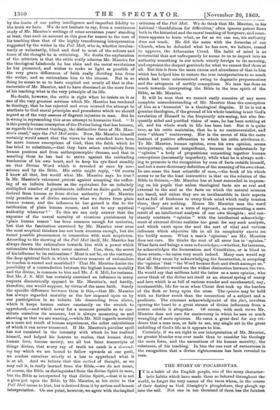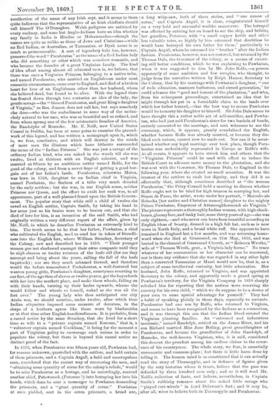THE STORY OF POCAHONTAS.
TT is a habit of the English people, one of the many character- • istic habits which have made them so beloved throughout the- world, to forget the very names of the races whom, in the course of their destiny as God Almighty's ploughshare, they plough up into the soil. Not one in ten thousand of them has the faintest. recollection of the name of any Irish sept, and it seems to them quite ludicrous that the representative of an Isiah chieftain should call himself The O'Donoghue. Welsh pedigrees are satirized by every cockney, and none but Anglo-lndians have an idea whether any family in India is Hiudoo or Mohammedan—though the names are quite as unlike as those of Jews and Christians—while cm) Red Indian, or Australian, or Tasmanian, or Dyak name is so much as pronounceable. A sort of legendary halo has, however, preserved the word " Pocahontas " as the name of a Red Indian lady who did something or other which was somehow romantic, and who became the founder of a great Virginian family. The kind of idea afloat among almost all educated men is, we believe, that there was once a Virginian Princess, belonging to a native tribe, and named Pocahontas, who married an Englishman under most romantic circumstances, came over to England, and died of a broken heart for love of an Englishman other than her husband, whom she believed dead, but found to be alive. With the legend there has floated down through two centuries an idea of the lady, the gentle savage—the "blessed Pocahontas, and great King's daughter of Virginia," as Ben Jonson does not call her, but says somebody else does—who was the embodiment in some way of the melan- choly natural to her race, who was so beautiful and so refined, and from whom sprang one of the few aristocratic families of America, the Randolphs of Roanoke. Mr. E. Neill, now United States Consul in Dublin, has been at some pains to examine the ground- work of this legend, and has written a monograph upon it, which is, we fear, conclusive, and which will destroy in the minds of most men the illusions which have hitherto surrounded the name of the "Indian Princess." She was just a savage of the ordinary Indian kind, who ran naked in the woods till she was twelve, lived at thirteen with an English colonist, and was married at fifteen by an ambitious settler named Rolfe, for the good of the colony, and from a secret hope of getting a good bar- gain out of her father's lands. Pocahontas, otherwise Matoa, was born in 1598, daughter to an Indian chief in Virginia, named Powhatan, the Sachem of a tribe very much dreaded by the early settlers ; but she was, in our English sense, neither Princess nor Queen, and the effort to exalt her rank was, to all appearance, part of a well-planned fraud upon the British Govern- ment. The popular story that while still a child of twelve she saved an English settler, Captain Smith, by taking his head in her arms just as his brains were to be beaten out, and that she died of love for him, is an invention of the said Smith, who had originally written a very different report of the affair, given by Mr. Neill, in which he describes Powhatan as extremely kind to him. The truth seems to be that her father, Powhatan, a chief who cultivated the English, used to send her in token of friendli- ness into the English fort, where William Strachey, Secretary of the Colony, saw and described her in 1610. "Their younger women goe not shadowed amongst their owne companie until they be nigh cleaver' or twelve returnee of the leafe old (for soe they accompt and bring about the yeare, calling the fall of the leafe taquitock) nor are they much ashamed thereof, and therefore would the before remembered Poehahuntas, a well-featured but wanton young girle, Powhatan's daughter, sometymes resorting to our fort, of the age then of eleven or twelve yeares, get the boyes forth with her into the markett place, and make them wheele, falling on with their hands, turning up their heeles upwards, whorne she would follow and wheele so herself, naked as she was all the fort over." The young lady who thus anticipated our city Arabs was, we should mention, under twelve, after which time Indian etiquettes imposed some measure of decorum, in the shape of a leathern apron like those worn by blacksmiths or at that time other English handicraftsmen. It is probable, from a casual notice by the same Strachey, that she lived for a short time as wife to a "private captain named Kocoum," that is, a "volunteer captain named Cookham," it being for the moment a part of Virginian policy to encourage such unions in order to populate the colony, but there is beyond this casual notice no distinct proof of the fact.
In 1613, when Pocahontas was fifteen years old, Powhatan had, for reasons unknown, quarrelled with the settlers, and held certain of them prisoners, and a Captain Argall, a bold and unscrupulous man, considered that the easiest way of recovering the men, and " obtaining some quantity of come for the colony's reliefe," would be to seize Pocahontas as a hostage, and he accordingly, coerced another chief, Patowomek (Potomac ?) into betraying her into his hands, which done lie sent a messenger to Powhatan demanding the prisoners, and a "great quantity of come." Powhatan at once yielded, sent in the seven prisoners, a broad axe, a long whip-saw, both of them stolen, and "one canow of come," and Captain Argall, it is clear, congratulated himself on a very bold and successful warlike mauceavre. The betrayal was effected by enticing her on board to see the ship, and bribing her guardian, Potomac, with "a small copper kettle and other less valuable toies, so highly by him esteemed that doubtless he would have betrayed his own father for them," particularly to Captain Argall, whom he esteemed his " brother " after the Indian fashion. Pocahontas, however, was not restored, but retained by Sir Thomas Dale, the Governor of the colony, as a means of extort- ing still better conditions, which he was explaining to Powhatan, when it was suggested to him by Mr. John Rolfe,—a person apparently of some ambition and few scruples, who thought, to judge from the narrative written by Ralph Hamer, Secretary to the Colony, that by his marriage with Powhatan's daughter, "one of rude education, manners barbarous, and cursed generation," he could advance the "good and honour of the plantation," and who, from his subsequent proceedings, entertained an idea that he might through her put in a formidable claim to the lands over which her father hunted,—that the best way to secure Powhatan would be to marry his daughter to himself. Sir John Dale seems to have thought this a rather noble act of self-sacrifice, and Powlia- tan, who had just sold Pocahontas's sister for two bushels of beads, entirely consented to the marriage, and sent witnesses to see the ceremony, which, it appears, greatly scandalized the English, whether because Rolfe was already married, or because they dis- liked such unions, cannot now be made out. Nor can it be ascer- tained whether any legal marriage ever took place, though Poca- hontas was undoubtedly represeuted in Europe as Rolfe's wife. At all events, it appears to have struck him and others that the "Virginian Princess" could be used with effect to induce the British Court to advance more money to the plantation, and she was sent with the Governor, Sir Thomas Dale, to England in the following year, where she created no small sensation. It was the interest of the settlers to exalt her dignity, and they did it so effectually that, although sonmtimes described as "the woman Pocahontas," the Privy Council held a meeting to discuss whether Rolfe ought not to be tried for high treason in marrying her, and Simon de Passe, the artist, wrote under her portrait, " Matoaks ale Rebeeka [her native and Christian names] daughter to the mighty Prince Powhatan, Emperour of Attanoughkornouck als Virginia." The picture represents a thoroughly Indian woman, with high cheek- bones, gloomy face, and lanky hair, some thirty years of age—she was only eighteen,—and who never can have been beautiful according to English ideas of beauty, dressed in a high felt hat, such as is now worn in North Italy, and a broad white ruff. She appears to have remained in England but a few months, and was returning home- ward when she died at Gravesend, on 21st May, 1616, and was buried in the chancel of Gravesend Church, as " Rebecca Wrothe," wife of "Thomas Wroth, gent., a Virginia lady borne." No trace whatever of her conversation or her character can be recovered, nor is there any evidence that she was regarded in any other light than a converted Tasmanian or Maori would now be, that is, as a subject of some intellectual curiosity, but little admiration. Her husband, John Rolfe, returned to Virginia, and was appointed Secretary to the colony, and apparently made a grand spring at Powhatan's territory, for the Virginia Company in 1618 sharply rebuked him for reporting that the natives were reserving the country for his own child, "which we do suppose to be a device of your own to some special advantage for yourself." They had a habit of speaking plainly in those days, especially to servants. Pocahontas had one son by Rolfe, who returned to Virginia, and seems to have been recognized by the Indians as a connection, and it was through this son that the Indian blood entered the Virginian planting families. An "esteemed and industrious mechanic," named Randolph, settled on the James River, and his son Richard married Miss Jane Bolling, great granddaughter of Pocahontas, and became the grandfather of John Randolph, of Roanoke, the well-known Virginian, who, it is said, considered this descent the proudest among his endless claims to the rever- ence of his countrymen. The whole story, we fear, is essentially unromantic and common-place ; but there is little harm done by telling it. The human mind is so constituted that it can actually read the story of Thermopylm, and in defiance of figures given by the very historian whom it trusts, believe that the pass was defended by three hundred men only ; and so it will read Mr. Neill's collection of facts, and believe, nevertheless, in Captain Smith's rubbishy romance about the naked little savage who "played cart-wheels" in Lord Delawares fort ; and it may be, after all, wiser to believe both in Therrnopylm and Pocahontas.



































 Previous page
Previous page